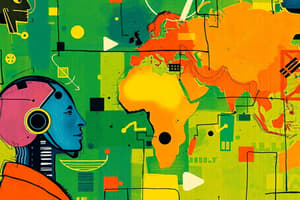Podcast
Questions and Answers
What is the projected number of jobs that may be lost to automation by 2040?
What is the projected number of jobs that may be lost to automation by 2040?
- 100 million
- 40 million
- 20 million
- 63 million (correct)
Which type of workers will be most affected by job automation?
Which type of workers will be most affected by job automation?
- Tech industry workers
- Highly skilled workers
- Unskilled and uneducated workers (correct)
- Mid-level professionals
Which of the following skills is highlighted as important for future job seekers?
Which of the following skills is highlighted as important for future job seekers?
- Financial literacy
- Technical programming skills
- Data analysis skills
- Interpersonal skills (correct)
Which jobs are expected to thrive despite increased automation?
Which jobs are expected to thrive despite increased automation?
What field of study is deemed crucial for future job opportunities?
What field of study is deemed crucial for future job opportunities?
What is recommended for individuals to remain competitive in the job market?
What is recommended for individuals to remain competitive in the job market?
What is one area in which robots cannot excel compared to humans?
What is one area in which robots cannot excel compared to humans?
Why should the future of work not be viewed with fear, according to experts?
Why should the future of work not be viewed with fear, according to experts?
Flashcards
Job Automation
Job Automation
The potential loss of jobs due to automation, predicted to affect approximately 63 million jobs by 2040.
Interpersonal Skills
Interpersonal Skills
Occupations that involve empathy, communication, and emotional intelligence, which robots struggle with.
Creativity
Creativity
The ability to generate new ideas, solve problems creatively, and think outside the box, which machines currently lack.
Skill Upgrading
Skill Upgrading
Signup and view all the flashcards
STEM Subjects
STEM Subjects
Signup and view all the flashcards
Flexibility
Flexibility
Signup and view all the flashcards
Automation
Automation
Signup and view all the flashcards
Diverse Skills
Diverse Skills
Signup and view all the flashcards
Study Notes
Automation and the Future Workforce
- Automation is increasing rapidly, impacting various industries.
- Projections estimate 63 million job losses due to automation by 2040.
- Robots offer higher precision, efficiency, and longer working hours than humans.
- Robots are likely to be utilized more often in repetitive tasks like factory assembly lines.
- Unskilled and uneducated workers are predicted to be most vulnerable to job automation.
Future Job Requirements
- Future job demands will prioritize higher education and specialized skills.
- Human abilities like empathy, communication, and emotional understanding will become crucial skills.
- Jobs requiring creativity and artistic thinking are anticipated to remain robust, such as designers and artists.
- Continual skill development is essential in the rapidly evolving job market.
- Proficiency in STEM fields (Science, Technology, Engineering, and Math) will be vital for future success.
Adapting to the Automated Future
- Developing interpersonal skills, like empathy and communication, will be highly valuable.
- Emphasizing creativity, imagination, and innovative thinking will be key.
- Continuous learning and skill enhancement are essential for staying competitive.
- Focusing on STEM subjects ensures relevance in the evolving job market.
- Automation will free humans from routine tasks, leading to new opportunities.
Studying That Suits You
Use AI to generate personalized quizzes and flashcards to suit your learning preferences.




